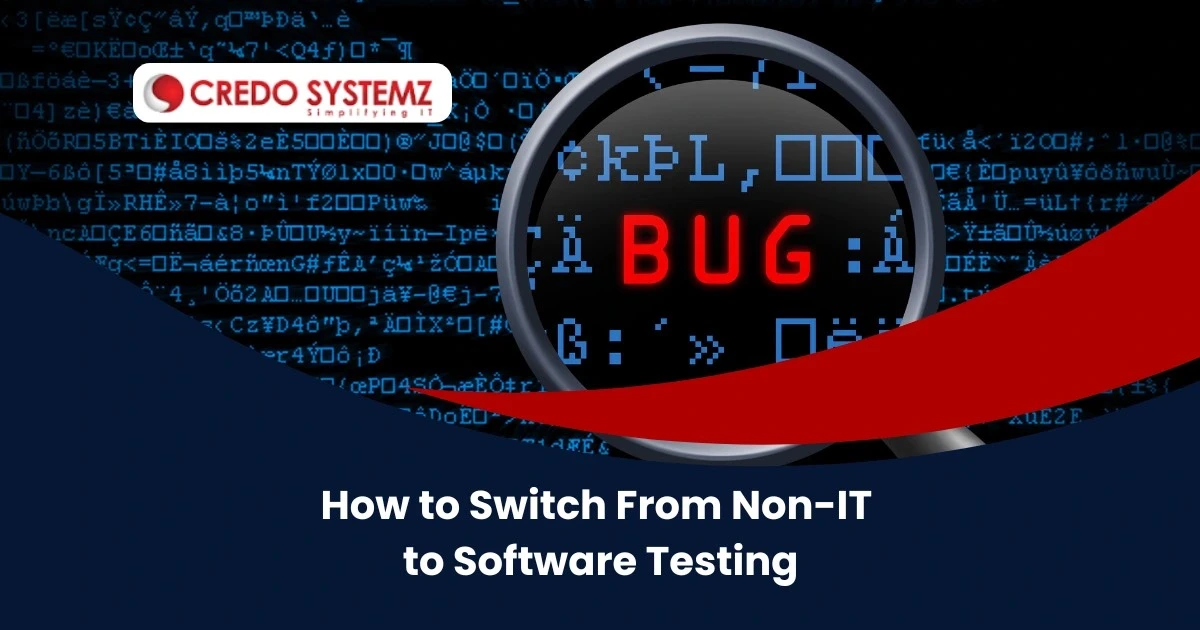
How to Switch From Non-IT to Software Testing
In the tech industry, switching from a non-IT background to software testing is highly beneficial. Software testing is crucial for the software development process that ensures quality and reliability.
Testing is an excellent career move as it requires less coding expertise. Let’s explore the step-by-step process to transition from Non-IT background into software testing successfully.
Basics of Software Testing
It is essential to understand the basics of software testing before choosing it as a career.
Key Concepts of Software Testing
- Defect: Any issue that causes the software or application to behave incorrectly or abnormally.
- Test Case: Set of steps, conditions, inputs to verify a specific functionality.
- Regression Testing: To ensure that the new updates / changes don’t break or impact negatively on the existing features.
- Agile & Scrum: Popular software development methodologies to deliver software efficiently.
Types of testing
- Manual Testing – Testing applications without automation tools using test cases.
- Automation Testing – Using tools like Selenium, Cypress, or TestNG to automate test cases and test execution.
- Functional Testing – Verifying the working functionality of software applications.
- Non-Functional Testing – Checking aspects like performance, security, and usability.
- SDLC & STLC – Software Development Life Cycle (SDLC) and Software Testing Life Cycle (STLC).
Learn the Required Skills of Software Testing
To start or switch your career into software testing, focus on the essential skills, such as:
- Analytical Thinking to identify the potential issues in any software application.
- Test Case Writing which covers different scenarios in detail.
- Defect Reporting to Understand how to log and report defects.
- Basic SQL Knowledge to validate data in databases.
- Basic Programming – knowledge of Java or Python is helpful for automation testing.
Software Testing Courses
Credo Systemz offers the best software testing training in Chennai which includes:
- Live, beginner-friendly sessions to gain the software testing knowledge,
- practical based training to learn about testing processes, methodologies and strategies,
- Skilled trainers from top MNCs to guide throughout the training,
- Placement services, certification support and lifetime assistance.
Learning about Testing Tools
The commonly used testing tools that are necessary to be learned for achieving various testing job roles are:
- Manual Testing Tools: Jira, Bugzilla, TestRail.
- Automation Tools: Selenium, TestNG, Cypress, JUnit
- API Testing Tools: Postman, Rest Assured
- Performance Testing Tools: JMeter, LoadRunner
Prepare for Testing Certifications
As certifications increase the credibility and add weightage to your resume, focus on the beginner-friendly testing certifications, like:
- ISTQB Foundation Level – globally recognized certification in software testing.
- Certified Agile Tester (CAT) – Testing in Agile environments.
- Certified Software Test Professional (CSTP) – manual and automation testing.
Build Your Resume and Apply for Jobs
To develop your technical resume for software testing roles, mention the testing skills, industrial projects and testing training.
Highlight the transferable skills from the previous job like problem-solving, analytical ability and leadership skills. Use LinkedIn and job portals to find entry-level testing roles and diverse job roles, like:
- Software Tester,
- Test Analyst,
- Automation tester,
- Software development engineer in test
- Performance tester,
- QA lead,
- Security tester
Prepare for Software Testing Interviews
The common interview topics to be prepared for testing interviews are:
- Difference between functional and non-functional testing.
- Writing test cases for common applications.
- Basic SQL queries for database validation.
- Defect life cycle and bug tracking.
- Knowledge of automation tools.
Conclusion
To sum up, Switching from a non-IT background to software testing is highly possible with the right approach, professional support and real-time training. By learning the fundamentals with strong understanding, gaining hands-on experience will improve your testing skills that leads to a successful testing career.
